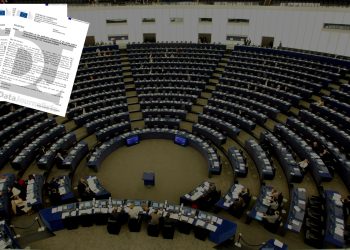- Why Greece has deprived itself of an important advantage of the Prespa Agreement.
- Athens’ micro-political games and the continuous undermining and erosion of defense cooperation. “Defeat” also for the Greek defense industry
- The “hidden” involvement of the Turks who are constantly gaining ground in the Balkans.
by Paris Karvounopoulos
The own goals are the ones that hurt the most. Not just in football. They are much worse when it comes to the foreign policy of a country like Greece, which, although it should be a protagonist and a leader in the Balkans, has its back against the wall even when it is facing North Macedonia, which after the signing of the Prespa Agreement it should naturally control. It has failed to do so, and the worst thing is that it is not the Skopje government that is to blame for this, but our own policy.
The recent announcement by Skopje that the control of the airspace of North Macedonia will be carried out by Italy and not exclusively by Greece, as provided for in the Prespa Agreement, is the self-goal that we mentioned above. And it is not the only one…
The history of the Prespa Agreement in brief: The Syriza government voted for it, and the ND as the main opposition then fought it, although behind the scenes all its executives hoped to complete it so that the “hot potato” would not pass into their hands. And so it was. In the 2019 election campaign, ND wore the armor of a gladiator, never saying it would scrap the agreement but hinting that it would “do something”. It did not specify what until it became government and we saw it in action.
The agreement divided Greek public opinion, with opponents talking about defeat and supporters focusing on its positive elements, which Greece could and should take advantage of. Those who supported the agreement pointed to Article 17, which provided for defense cooperation between Greece and North Macedonia. What was foreseen, gave Greece the ability to control not only the airspace of the neighboring country but also its armed forces. How?
* The airspace would be controlled by flights of Greek fighter aircraft. This was done in the first months of the agreement. Greek fighter jets could also use Skopje airport. From February 2019 until the autumn of the same year, there were at least two fighter aircraft flights in Skopje’s FIR. On 4 April 2019, the then Chief of the General Staff, General Christos Christodoulou, paid an official visit to the Republic of North Macedonia, where he met with the Minister of Defense Radmila Shekerinska, as well as his counterpart, Lieutenant General Vasko Gjurchinovski. As reported by the Joint Chiefs of Defense, “During the bilateral contacts, the further strengthening of military cooperation, air policing of the airspace of the country in question within the framework of NATO, as well as Greece’s assistance in the rapid adaptation of the military structures of the neighboring state to the standards of the Alliance were discussed”.
The agreement also provided for cooperation in the field of search and rescue
Most importantly and perhaps less known was that through the provisions of the agreement, Greece had the opportunity to undertake the “building” of the Armed Forces of North Macedonia on the basis of NATO standards in order to facilitate its entry into the Alliance. Even military officers who did not look kindly on the Prespa agreement admitted that this provision was a golden opportunity for Greece to “assimilate” North Macedonia.
The agreement provided for the training of their officers in Greek military schools and cooperation even at the level of secret services.
Signed September 2019. It provided for “assistance on issues of integration of the Armed Forces (AF) of North Macedonia into the Alliance structures, issues of education and training of staff in Greek Military Institutions and Schools of the three branches of the AF, provision of specialized training at the Multinational Peace Support Operations Training Center, the Naval Deterrence Centre and the Integrated Air and Missile Defense Centre of Excellence – (IAMD CoE), actions to further upgrade cooperation in Special Operations by conducting joint training courses in facilities of both countries, as well as cooperation on cyber, intelligence, military medicine, and logistics issues.
The feeling that existed from the then Chief of Staff and his staff was that the neighbors were looking for a “shield” and it was obvious that of all their surroundings, they preferred “Greek protection”. An obvious conclusion, is that Albanians and Bulgarians do not want the country to exist and the only ones interested in getting involved are the Turks. But whom North Macedonia does not trust and this has been publicly stated by Angelos Syrigos, professor of international relations, official, and minister in the Mitsotakis government.
With the rise of the Mitsotakis government to power in July 2019, nothing has changed. Among the three memorandums of cooperation that had to be approved by the Greek Parliament, was the one of defense cooperation. The Mitsotakis government, not wanting to cause resentment among the part of its voters who had believed that it would “do something” about the hated Prespes agreement, played “delaying tactics” throughout the four years.
After his visit to Athens, North Macedonian President Stevo Pedarovski said: “When I asked about Greek obligations, cooperation in the police sector, etc., nothing sensitive, the prime minister (Mitsotakis) said he did not want to rub salt in the wounds. And that the political situation in Greece at the moment is not suitable for this kind of situation.”
But even so, he could still keep the defense cooperation between the two countries alive. However, the flights of Greek fighter jets started to become sparse, no joint search and rescue exercises were planned and the opportunity to create and develop the defense structures of North Macedonia ourselves was missed.
The government in Skopje expected a change in the Greek attitude, which never came
Turkey, which has never ceased to deal with Skopje, proceeded with the provision of free military equipment and training in April 2021. It provided free tank carriers, 7,500 camouflage uniforms, as well as training, highlighting the capabilities of the Turkish defense industry. It did it again in 2014.
Turkish intrusion in the Balkans not only takes the form of military assistance, but also consists of other forms, such as economic, as well as other similar actions (e.g. exploitation of airports, Skopje, and Pristina/Kosovo by Turkish companies TAV/Limak since 2010, and attempted a similar effort in Albania/Vlora in 2021).
Even then Athens was not awakened. The erosion of defense cooperation continued.
There is another dimension of the issue that has to do with the Greek defense industry. North Macedonia is certain that in order to acquire NATO-level Armed Forces it will have to buy equipment that is also certain to be mostly second-hand. The Greek defense industry could commit to Skopje in advance that all necessary upgrading and technical support work would be undertaken by Greek companies. When the issue was discussed at the level of the Ministry of Defence staff, the paradoxical answer was given that “the Minister of National Defence, (Nikos Panagiotopoulos) is elected in Kavala” and therefore a possible visit to the neighboring country during which he would be accompanied by Greek businessmen would not be pleasant to his voters. Panagiotopoulos was elected first in Kavala in the May 21st elections. The Greek defense industry is again waiting for an opportunity to “resurrect” itself.
Source Images: Italian Air Force, Italian Ministry of Defense












Discussion about this post